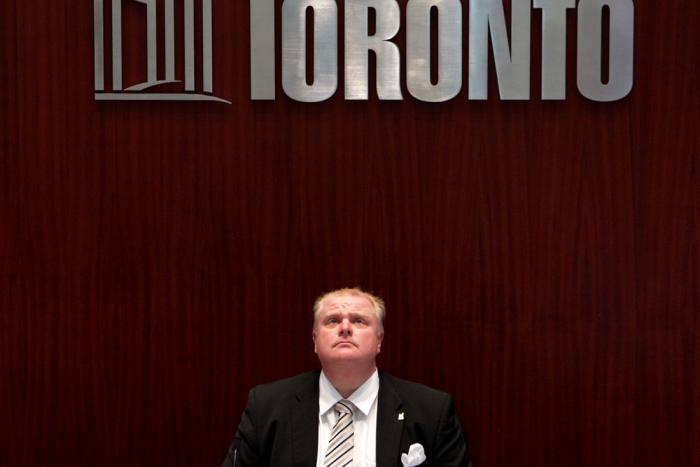After Wendy Babcock killed herself in August 2011, the headline on the Toronto Star story was: “Prostitute turned Osgoode law student found dead.” Four months later, Kathy English, the paper’s public editor, cited the piece in her year-end You Be the Editor column and online poll: “When a law student who formerly worked in the sex trade dies suddenly, a reporter learns that the woman once corrected a law professor for referring to ‘prostitutes’ instead of ‘sex workers.’ In the story and headline about her life and death do you refer to her as an ‘ex-prostitute?’” Seventy-two percent of respondents said, “No.”
I was vaguely aware that the demonization of “prostitute,” while not new, had been catching on with more people. So last month when a young journalist regaled me with an account of a businessman in a bar with two prostitutes, my mischievous response was, “I thought you weren’t supposed to say that.”
Our conversation about bars immediately became one about another of my favourite subjects: words. After dishing about a newsroom battle between a middle-aged male editor and a young female reporter, she admitted she was torn on which term to use. I have no such doubts. Yes, parlance is powerful and, obviously, not all words are okay—I’ve been around long enough to remember when racial slurs were tossed around casually—but we adjust our vocabulary after our attitudes begin to change, not the other way ‘round. Efforts to force new expressions on people inevitably, and not always unfairly, spur charges of “Political correctness run amok.” Besides, new nomenclature won’t make a difference. Changing the world, especially when it requires changing attitudes, is far more difficult than simply swapping the words we use.
The language modification fans believe more respectful terms will help their causes. Daryl Lang sums up the argument on his blog BreakingCopy: “The word prostitute, as a noun, carries the person’s entire identity in one word and casts someone as an object for sale. The phrase sex worker describes a human being performing a task for money.”
Impressive bit of linguistic gymnastics that. By this logic, nurses have one-dimensional identities while health workers are human beings saving lives and miners are drones destroying the planet while mine workers are just providing for their families. No, if prostitute reduces someone’s identity to one word, then sex worker does it in two words. Hardly a victory. If anything, the latter term is more contentious because it actually includes “sex,” presumably the part of the job that turns some people off.
I wasn’t surprised to learn that Lang’s day job is copywriting for a New York technology company. After all, cynical corporations, governments, and unions love newspeak. Subway may think we’re impressed that its low-wage employees are “sandwich artists,” but the fast-food company isn’t fooling anyone. Nor is the union that refers to garbage collectors as “sanitation engineers.”
True, savvy activists and politicians regularly seek to “frame the debate” by convincing others to adopt their terminology. Conservatives call us taxpayers while progressives want us to be citizens. We’re both, of course, but the two words have different meanings: “taxpayer” winds us up about governments wasting our hard-earned money while “citizen” reminds us of our broader participation and responsibilities in a democracy. Sex worker and prostitute, on the other hand, are two terms for the same thing—except one is weak, sanitized, and vague and the other is strong, simple, and clear.
Derived from Latin and dating from the early 1500s, “prostitute” is the neutral, almost technical term for a job rife with both euphemisms such as “escort” and slurs such as “whore.” Although few mothers have wanted their kids to work in prostitution, let’s not confuse maternal cut eye with any problem inherent to this honourable word. If prostitution carries negative connotations, it’s because some people think the vocation is immoral or demeaning or dangerous. As long as that stays true, advocates will always be hunting for new language.
When I was growing up, “crippled” was in everyday usage; in fact, “disabled” would have drawn blank stares. (Ever snag a fun frock or cool shirt at Goodwill? You may be surprised to know that in Toronto the charity began as the Society for Crippled Civilians and didn’t adopt its current name until the 1970s.) Eventually, “handicapped” replaced “crippled” and then, soon after, we all settled on “disabled” (“differently-abled” was too much for most people).
To the extent that our attitudes toward and treatment of people with disabilities have improved—yes, still work to do here—it’s not because of new language, but rather because people fought long and hard to make schools, offices, and public spaces more accessible. Meanwhile, Rick Hansen’s Man in Motion tour took him around the world in his wheelchair—now, that raised awareness and changed attitudes. But these developments would have happened even if we all still said crippled in polite company.
Similarly, the National Association for the Advancement of Colored People’s name is a reminder that not so long ago no one would have flinched at “colored.” Again, a long way to go on this, but more sensitive language didn’t beget racial tolerance. More tolerance—hard won through the sacrifices of people willing to march and protest, do jail time, suffer beatings, and even die—begat sensitivity to language.
Our delicate sensibilities can lead us to fear some words without reason. A couple of years ago I intentionally dropped “niggardly” into a conversation with a student. I knew I’d get a rise out of her despite her excellent knowledge of grammar and usage (I wasn’t just being a shit-disturber, I saw it as a teachable moment). When she protested—more politely than I’d hoped—we looked it up. It means stingy and is related to niggling, not the n-word. But even if she knew what niggardly meant, would she ever use it? Hell, I rarely have the guts to say it. And yet, being offended by niggardly makes no more sense than taking umbrage at country, vacant, or shiitake.
I understand the desire to change attitudes but vandalizing the language isn’t the way to do it. Many years ago I wrote a book about activists and one quote has stuck with me like an earworm. Duff Conacher, founder of Ottawa-based Democracy Watch, argued that it’s easy to be active, but hard to be effective. “There are a lot of activists,” he said, “there aren’t a lot of effectivists.” The crusade to shun a 500-year-old word and replace it with sanitized jargon is a perfect example of being active without being effective.
Attitude adjustment is a tough slog without short cuts. Hate crime laws, for example, though certainly welcome, have not ended gay bashing. If the goal is to make prostitution more socially acceptable or afford its practitioners more respect, changing the language isn’t going to do it.
Worse, these words games distract from the battle to ensure the human, legal, and labour rights of prostitutes and to keep them safe. When a B.C. farmer can kill dozens of women, many of them prostitutes, before the RCMP—a police force struggling with its own sexual harassment scandals—gets around to making an arrest, we know the challenges run much deeper than the words we use.






